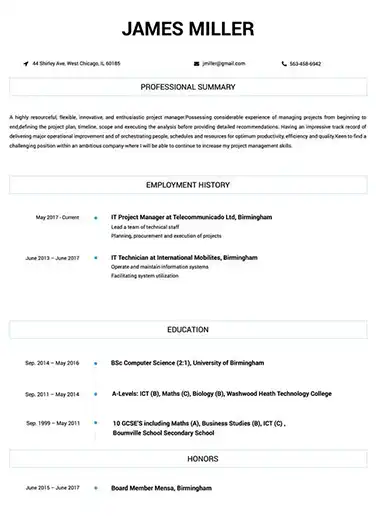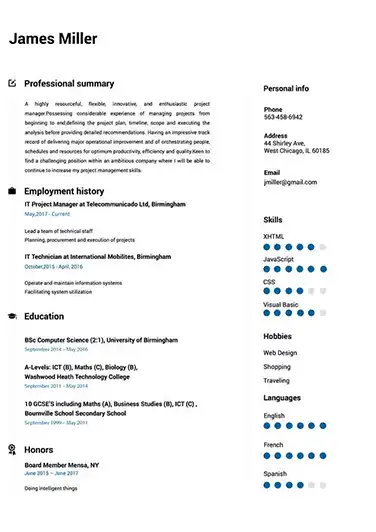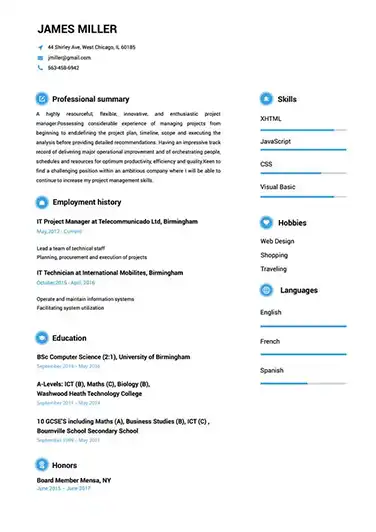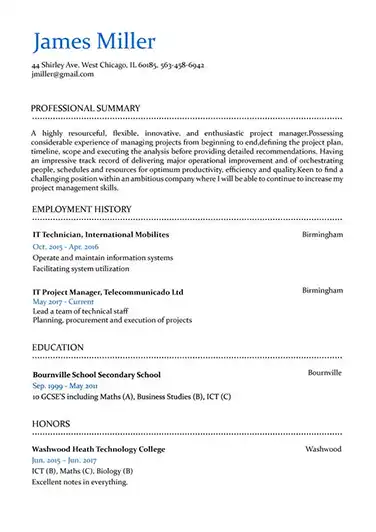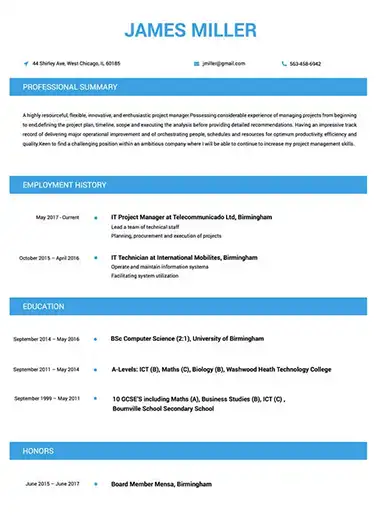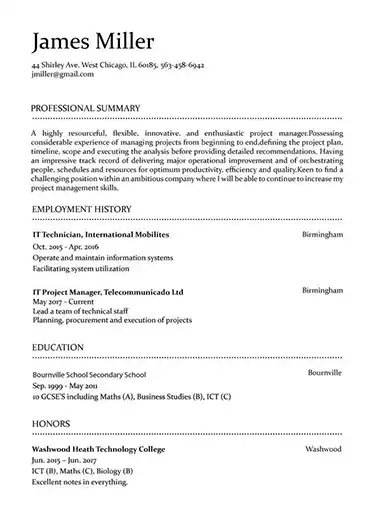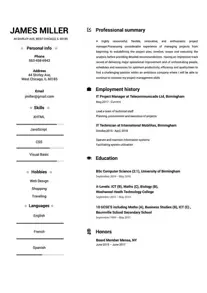 Use This Template
Use This Template
Build your resume in 15 minutes
Create an awesome resume that meets the expectations of potential employers with our selection of professional, field-tested resume templates.
civil engineer: Resume Samples & Writing Guide
scotthenry@hotmail.com
808-529-3987
Employment history
- Performing technical studies, such as environmental impact assessments, land use analyses, and traffic studies
- Analyzing survey reports, maps, drawings, blueprints, aerial photography, and other topographical or geologic data
- Consulting with clients and other stakeholders
Education
Skills
Do you already have a resume? Use our PDF converter and edit your resume.
neildavis@zoho.com
663-776-2281
Employment history
- Inspecting construction sites to monitor progress and ensure conformance to engineering plans, specifications, and safety standards
- Performing risk assessments and developing solutions to mitigate hazards
- Establishing and maintaining relationships with contractors, vendors, and suppliers
- Analyzing survey reports, maps, drawings, blueprints, aerial photography, and other topographical or geologic data
- Estimating project costs and completing cost-benefit analyses
- Ensuring compliance with applicable codes, standards, and regulations
- Performing risk assessments and developing solutions to mitigate hazards
- Managing and directing personnel and vendors
- Preparing and presenting reports, designs, and project updates
Education
Skills
wilsonursula@outlook.com
968-452-9623
Professional Summary
Employment history
- Establishing and maintaining relationships with contractors, vendors, and suppliers
- Ensuring compliance with applicable codes, standards, and regulations
- Designing and developing new projects
- Establishing and maintaining relationships with contractors, vendors, and suppliers
- Investigating potential project sites
- Managing and directing personnel and vendors
- Preparing and presenting reports, designs, and project updates
- Performing risk assessments and developing solutions to mitigate hazards
- Estimating project costs and completing cost-benefit analyses
Education
Skills
stanleywilson@protonmail.com
750-086-4817
Professional Summary
Employment history
- Consulting with clients and other stakeholders
- Analyzing survey reports, maps, drawings, blueprints, aerial photography, and other topographical or geologic data
- Performing risk assessments and developing solutions to mitigate hazards
- Ensuring compliance with applicable codes, standards, and regulations
- Consulting with clients and other stakeholders
- Managing and directing personnel and vendors
- Establishing and maintaining relationships with contractors, vendors, and suppliers
- Performing risk assessments and developing solutions to mitigate hazards
- Preparing and presenting reports, designs, and project updates
Education
Skills
edevans21@inbox.com
875-955-0530
Employment history
- Performing technical studies, such as environmental impact assessments, land use analyses, and traffic studies
- Consulting with clients and other stakeholders
- Inspecting construction sites to monitor progress and ensure conformance to engineering plans, specifications, and safety standards
Education
Skills
Not in love with this template? Browse our full library of resume templates
Beloved science communicator Bill Nye “The Science Guy” once said, “There’s nothing I believe in more strongly than getting young people interested in science and engineering, for a better tomorrow, for all humankind.”
Civil engineers will be quick to agree that civil engineering plays a vital role in shaping society. This discipline of engineering encompasses a number of critical tasks including designing, constructing, supervising, and maintaining the physical and naturally built environment and infrastructure.
As The Guardian points out, people tend to primarily associate civil engineering with the construction of world famous structures. But this represents just one small part of what this profession entails. The other much larger part involves attending to the infrastructure that we depend on every day, such as roads, railways, bridges, energy and water supply, waste networks, and flood defences.
Given how fundamental this role is to society, it’s therefore surprising that the profession’s projected job growth is just over average. According to the Bureau of Labor Statistics’s latest projections, employment of civil engineers will grow by 6 percent from 2018 to 2028. This is only 1 percentage point higher than the average for all occupations.
So what does this mean for civil engineers who are currently on the job hunt, gunning for a promotion, or simply want to secure their future in the industry? Your resume needs to be immaculate.
Don’t worry if you don’t know the first thing about improving your resume or making a new one from scratch. Our civil engineer resume writing guide will address everything you need to know. In it, we’ll share our top tips for:
- Selecting the right format and layout
- Showcasing your PE license and additional training
- Writing eye-grabbing achievements
- Captivating the recruiter with your resume objective or summary
- Creating a striking resume with a resume builder
1. Multiple Template Examples
2. How to Write a Job-Winning Civil Engineer Resume
How should you format your resume?
Many candidates who tick all the boxes a recruiter is looking for may be surprised when they receive a dreaded rejection email. They wonder how their resume got rejected when they wrote everything to perfection. While we can’t speak for all of these candidates, there’s a good chance that a good proportion of their resumes were rejected due to subpar formatting.
In the cut-throat recruitment process, every single element of your resume matters – including the format and layout you use. Some candidates try to invent their own format despite that time and time again this has proven to be a recipe for disaster.
It’s well worth keeping in mind that recruiters aren’t looking for creatively formatted resumes. They want to read well-organized resumes that stick to standard guidelines. That’s why we suggest using a reverse-chronological format.
We’re not the only ones who recommend this winning format, either. It’s generally accepted to be recruiters’ preferred format due to the fact that it hones in on your work history. After all, this section gives recruiters the biggest insight into what you bring to the table as a potential employee. In this format, your most recent work experience is featured first, followed by the next most recent one, and so on.
In terms of your layout, we strong recommend upholding the following layout guidelines:
- Number of Pages: 1 page maximum.
- Fonts to Use: Legible fonts that won’t be misread such as Verdana and Didot.
- Fonts to Avoid: Any font that makes it appear as if you don’t take your application seriously. For example, Bonzai and Dark Crystal.
- Margins: 1 inch on all sides.
- Line Spacing: 1 or 1.15.
- Header size: 14-16 point size.
- Text size: 11-12 point size.
As you can see above, these layout rules aren’t complicated. The hard part is ensuring that you’ve implemented them in a uniform way throughout your whole resume.
What are the most important sections to include in your resume?
Each section of your civil engineer resume is a chance to demonstrate how your attributes perfectly align with what a recruiter is searching for. Here are the most important ones you will need to include in your resume:
- Contact information: List your name, address, email address, best contact number, LinkedIn URL, and any other information a recruiter could need to contact you.
- Resume objective or resume summary: Similar to an elevator pitch, these 2 to 4 sentence long sections communicate why you’re the ideal candidate for the job. Only include one or the other.
- Education: A summary of your educational background.
- License and certifications: Details about your PE license (if you have one) as well as any relevant training you’ve undertaken.
- Professional experience: An overview of your most relevant work history. Along with each company’s name and position, include key achievements in a bulleted list.
- Skills: A list of 6 to 8 skills that have direct relevance to the advertised position.
Pro tip: Including a link to your engineering portfolio in your contact information section will help you stand out. For tips on making one, read this handy guide.
Where should you list your additional training and PE license as a civil engineer and how can you do it correctly?
You already know that you need to list your civil engineering degree/s in your resume’s “Education” section. But where should you correctly list any relevant additional training and your professional engineer (PE) license?
You should list your PE license (if you have one) and additional training in a dedicated “License and Certifications” section. Just make sure any certifications you feature are genuinely relevant to the job you’re applying for!
You will then need to create separate subheadings if you have both licensure and certifications to your name.
For your PE license, create a subheading called “License” and state:
- The license name (i.e. Professional Engineer (PE) License)
- The state you obtained it in
- The year you obtained it
For any training and certifications, create a subheading called “Training and Certifications” and state the following information for each one:
- The name of the training course or certification
- The name of the institution that issued it
- The state you completed it in
- The year you received it
In the end, your license and certifications section should look something like this:
LICENSE AND CERTIFICATIONS
License
- Professional Engineer (PE) License, NY, 2017
Certifications
- Geotechnical Engineering Certification, American Society of Civil Engineers, NY, 2020
- Autodesk Certified Professional, Autodesk, NY, 2017
Pro tip: You can put an additional spotlight on the fact that you hold a PE license by featuring it in your resume headline. For example, you could write:
[Your Name]
[Civil Engineer, PE]
What are the technical and interpersonal skills a civil engineer needs?
Civil engineers need to draw on a range of skills in order to effectively complete their work. Many job seekers searching for civil engineering jobs understand that it’s important to highlight their strong technical skills, otherwise known as ‘hard skills’, in their resume to catch a recruiter’s attention.
However, they’re unaware of or dismiss the fact that these skills are just one part of the story. Civil engineers also need to offer a plethora of interpersonal skills (often referred to as ‘soft skills’) in order to be regarded as a strong, well-rounded candidate.
The technical and interpersonal skills you need as a civil engineer will depend on the specific criteria of each job. You can discover what a recruiter is looking for by looking for ‘keywords’ in a given job ad. Keywords are words that indicate what a recruiter is seeking from an ideal candidate.
To determine what skills a recruiter values, you simply need to look for skills-based keywords.
We scanned real-life job ads for civil engineer positions to find some of the most popular skills-based keywords recruiters are using. Check out a selection of the keywords we found:
Technical skills
- Reading and understanding construction drawings
- Preparing designs
- Preparing permitting application packages
- AutoCAD Civil 3D proficiency
- HEC-HMS proficiency
- Calculating project costs based on analysis of collected data
- Ability to use computer assisted engineering and design software
- Preparing, analyzing, and modifying reports, specifications, and plans
- Ability to interpret tests and aerial photographs
- Reviewing submittals
Interpersonal skills
- An analytical mind
- Strong written and verbal communication skills
- Determination
- Work ethic
- Teamwork skills
- Time management
- Attention to detail
- Problem-solving
- Research
- Creative thinking
Keep in mind that you shouldn’t just use the keywords we featured above in your resume. You will need to scan the job ad of any job you’re interested in to find the keywords that are relevant to that particular job.
Once you’ve identified the keywords in a job ad and have worked out which ones match with your own skill set, you can start adding them to your resume. Be sure to include them in the following 3 sections:
- “Skills” section: Include 6 to 8 relevant skills in list form.
- “Employment History” section: Incorporate relevant skills throughout your achievements (refer to the next section to learn how to do this).
- “Resume Objective” or “Resume Summary” section: Include at least a few relevant skills.
Pro tip: There’s another vital reason why your resume needs to feature keywords: the Applicant Tracking System (ATS). The ATS is a tool recruiters use to field candidates. It works by rejecting or accepting resumes based on a number of factors. One of the most crucial ones is keywords. If the ATS identifies that your resume features little to no keywords, it will be rejected in a matter of milliseconds. So if you want to pass the ATS (and in turn, progress your application), be sure to include the right ones that the recruiter used in job description.
How to highlight your most important achievements
The achievements you feature in your resume’s “Employment History” section should cause a recruiter to take notice. Each and every one should serve as a testament to your suitability for a given role.
With no space to waste, you’ll need to be ultra selective about which ones you highlight.
Consequently, only your most relevant achievements can make the cut. You can easily work out which are relevant by scanning a job ad for keywords that indicate what attributes a recruiter is seeking from the perfect candidate. You can then create achievements based on the keywords that apply to your professional experiences.
If this all sounds familiar, that’s because it’s the same method we outlined above to find relevant skills. In fact, most of the keywords you identify will be the same ones you listed in your “Skills” section. The primary difference is that by incorporating them into your achievements as well, you’ll be able to expand on how you utilized them.
Now that you know all about using keywords to select achievements, let’s analyze some examples of good and bad civil engineer achievements. For the purposes of this exercise, let’s make the focus keyword, ‘review submittals’.
First, take a look at this uninspiring achievement:
- Thoroughly review submittals to ensure everything is fine for approval.
A recruiter would be disappointed by it for a number of reasons. Not only is this achievement too general, but it also shows that the candidate is doing the bare minimum of what is expected from a civil engineer carrying out this duty.
Another problem with it is that it’s written as a simple statement of fact that they review submittables. A recruiter would be far more impressed if they also highlighted the result their submittal reviews have had, like this candidate did:
- Thoroughly review submittals to ensure they are always in line with the company’s expectations, as exemplified by my identification of a $2 million error.
How much more powerful does this achievement sound thanks to the fact that the candidate quantified it? Instead of merely stating that they review submittals, they showed how skilled they are at doing so by pointing out the huge error they were able to identify. The recruiter would be blown away reading this because it shows that the candidate truly knows what they’re doing when it comes to reviewing submittals.
To sum up, if you also want to ensure your achievements sound equally exceptional, always remember to center them around relevant keywords and provide eye-catching examples to back up what you say.
How to write a resume objective or summary
Your resume should either feature a 2 to 4 sentence long resume objective or resume summary. The former is ideal for entry-level candidates, while the latter is suitable for experienced candidates. Below, we’ll run through all of the details you need to make a perfect one that fits your circumstances.
Resume objective
A resume objective, also called a career objective, is an opportunity for entry-level candidates to summarize why they’re an ideal match for the position. It’s worth including one on your resume as it’s the only section that provides you with the opportunity to connect with the recruiter on a more personal level. It gives you the chance to highlight not only your suitability for the role, but also your career goals.
Before you dive in, keep in mind that there’s a certain art to writing a strong civil engineer resume objective. For example, you won’t want to follow this candidate’s suit:
- Recent civil engineering graduate who is looking for an opportunity to get their foot in the door at The McDonald Group of Civil Engineers. I plan to utilize the relevant skills I hold to ensure I am an asset to the company.
While this isn’t even the worst civil engineer resume objective we’ve come across, it’s nevertheless completely lacklustre. The most obvious problem is that it’s far too general. The candidate provides a vague description of who they are and what they intend to do should they get the role at The McDonald Group of Civil Engineers.
As you may have noticed yourself, they don’t even specify which skills they plan to utilize – other than saying that they’ll be “relevant”. Consequently, the recruiter isn’t given any indication of what these skills actually are. Moreover, the candidate shares that they plan to be “an asset to the company,” but they haven’t given the recruiter a single reason to believe this to be true.
What, then, does a great civil engineer resume objective look like? Take a peek yourself:
- Recent Bachelor of Science in Civil Engineering (BSCE) from Cal Poly Pomona (3.5 GPA) graduate wishes to bring their analytical thinking skills as well as their ability to confidently use a variety of computer assisted engineering software to a position at The McDonald Group Civil Engineers. As an aspiring civil engineer, I would ensure that I complete all tasks, including analyzing reports, to the best of my abilities.
This example showcases precisely the high standard you should strive for when writing your own resume objective. Any recruiter would be impressed by it because the attributes the candidate has highlighted work to frame them as an attractive potential employee. This, in turn, gives the recruiter a reason to delve deeper into the candidate’s resume.
For example, the candidate specified which school they received their civil engineering degree from and even highlighted their impressive GPA. They also made known precisely which relevant skills they offer, including both useful soft skills (analytical thinking skills and motivation to succeed) and hard skills (their ability to confidently use a variety of computer assisted engineering software and analyzing reports).
What’s particularly impressive about this resume objective is that it sells the candidate so well that the recruiter may easily forget they’re an entry-level candidate! Despite having no formal work experience as a civil engineer, their resume objective effectively presents them as a highly skilled candidate who would be a valuable employee at The McDonald Group Civil Engineers.
Pro tip: Only mention your GPA if it’s 3.5 or higher.
Resume summary
Also called a summary statement, a resume summary is a way for experienced candidates to differentiate themselves from the other candidates they’re running against. A resume summary is vital because it’s often the gateway to a recruiter reading the rest of your resume.
In order to write one that convinces them to keep reading, rather than move on to the next candidate’s resume, make sure you don’t write a low-quality one like the following candidate did:
- Civil engineer with 5+ years of experience who is seeking a new position at a reputable company like Golden Designs Civil Engineering. I would not only draw on my extensive hard skills in civil engineering, but also my soft skills.
The problem with this example is that it could be written by just about any civil engineer. The candidate hasn’t put a spotlight on any attributes that would make themselves memorable in the eyes of the recruiter. For example, they state the obvious fact that they’re seeking a position at Golden Designs Civil Engineering, but don’t expand on why the company should be eager to hire them.
Moreover, they share that they would draw on their extensive hard and soft skills in civil engineering if hired, but don’t clarify what these skills are. This is inadvisable to do as it puts the onus on the recruiter to figure out what they are, which is a big gamble, considering most won’t waste the time to do so.
Let’s now take a look at a superior example of a civil engineer resume summary:
- Analytically-minded civil engineer with 5+ years of experience utilizing their proficiency in AutoCAD Civil 3D and strong communication skills to see several multi-million dollar projects to completion. I am to bring my strong attention to detail and excellent mathematical skills to contribute to the great work Golden Designs Civil Engineering is already doing. Currently working towards my PE license.
A recruiter would consider this to be one of the top resume summaries they read because it clearly outlines why the candidate is worth interviewing. The candidate frames themselves as a civil engineer who boasts a strong balance of soft skills (communication skills and attention to detail) and hard skills (AutoCAD Civil 3D and mathematical skills). They haven’t just stated they have them, either. They’ve quantified them by highlighting that they drew on them to complete “several multi-million dollar projects.”
Another reason this resume summary is so well-written is that the candidate was careful to demonstrate the value they will bring to Golden Designs Civil Engineering if hired. This is notable because many candidates make their resume summaries about what the company can do for them, instead of focusing on what they can do for the company.
One final thing the candidate did right is mention the fact that they’re currently completing their PE. A PE is highly valued by employers, so it’s important to mention yours if you hold one or are working towards it.
How to write a civil engineer resume when you have little or no experience
Rest assured that you’ll be able to write a stunning civil engineer resume even if you have little or no experience. Here are our top 5 tips for entry-level candidates looking to make a positive impression:
- Use a resume format that’s ideal for entry-level candidates: The best resume format for entry-level candidates is a functional resume format. It emphasizes the skills you offer rather than your professional experiences (or lack of them!) so you can let your skill set shine.
- Don’t forget about soft skills: Many entry-level candidates are intimidated by the fact that they don’t have many of the hard skills a recruiter is seeking. That’s why you should instead focus on the soft skills that they’re after.
- Include your internships: If you haven’t worked as a civil engineer yet, any internships you’ve undertaken should take center stage. In your resume, put a spotlight on the most relevant duties you carried out and the skills you had to utilize.
- Highlight any other relevant experiences: Have you taken any freelancing assignments or volunteer roles that required you to draw on some of the relevant skills you possess? We’re guessing that you at least had to demonstrate soft skills such as organization, excellent communication, diligence, and work ethic. Bonus points if you also had to use relevant hard skills!
- Write a cover letter: Writing an impressive cover letter to go along with your resume is sure to leave a positive impression with a recruiter. You’ll be able to provide a more in-depth explanation about why you’re an ideal candidate in your cover letter than in your resume objective or summary. To start, we suggest taking a read of this cover letter writing guide for entry-level candidates.
How to make your resume stand out
Ready to take your resume to the next level? The following 3 tips will help it get there:
- Highlight your promotions: One of the easiest ways to stand out is to highlight any promotions you’ve received. Unfortunately, many candidates don’t end up doing so as they’re unsure how to do so. Indeed explains that there are 3 ways to show a promotion on your resume:
- Create stacked entries under the same company header for positions with similar duties.
- Create separate entries under the same company header for positions with different duties.
- Create two entries under duplicate company headers if you return to a company for a promotion.
As there’s one to suit each circumstance, make sure to read the article to determine which is best for yours.
- Ensure it’s free of fluff: A great civil engineer resume doesn’t only look professional, but it also boasts the necessary substance to catch a recruiter’s eye. This means that fluff or irrelevant information has absolutely no place in your resume. If any information you’ve included looks out of place, there’s a good chance that it’s not necessary to include. Be cut-throat when editing your resume so that it’s squarely focused on the specific job you’re applying for.
- Make sure your resume is 100% accurate: Even if you’d never lie on your resume, it’s still wise to double check that everything you’ve written is 100% accurate. Perhaps you finished your job in May 2020, but accidentally wrote March 2020. Or maybe you wrote the wrong job title. If a recruiter spots a mistake when they’re running a background check on you, they may not believe you just made an innocent mistake.
3. How to Easily Create a Fantastic Resume Using Resumebuild.com’s Efficient Resume Builder
If you’re reading this section, we’re guessing that you’re looking for an easier way to make a fantastic civil engineer resume. This is completely understandable given how convoluted the typical resume making process is.
After all,you’ll usually need to spend at least a couple of hours formatting your resume and getting the layout just right. Then, you’ll need to spend several days writing everything up. And let’s not forget that you’ll probably need to go back and fix any weird formatting errors that cropped up. All in all, it’s an unpleasant process to say the least!
That’s why you may find it worthwhile to use a resume builder to make your resume. In case you don’t know what one is, a resume builder is an online program that guides you through all of the fundamental steps to creating a resume.
The reason we say that they may be worth using is because sadly, there are many that just pump out low-quality resumes that look and sound terrible.
Fortunately, you’ll find that the state-of-the-art one we offer at Resumebuild.com is well worth using. Our team as well as our customers believe that our resume builder is superior to all other offerings because it’s 100% pain-free and super simple to use. It has all of the features you could hope for in a resume builder, including professionally-designed resume templates, job-specific pre-written examples to choose from, and a user-friendly interface.
If you’re interested in using a tried-and-tested method of making a civil engineer resume that is guaranteed to draw recruiters in, use our builder to start building your resume today.
civil engineer Job Descriptions; Explained
If you're applying for an civil engineer position, it's important to tailor your resume to the specific job requirements in order to differentiate yourself from other candidates. Including accurate and relevant information that directly aligns with the job description can greatly increase your chances of securing an interview with potential employers.
When crafting your resume, be sure to use action verbs and a clear, concise format to highlight your relevant skills and experience. Remember, the job description is your first opportunity to make an impression on recruiters, so pay close attention to the details and make sure you're presenting yourself in the best possible light.
civil engineer
- Residential independent Bungalow development .
- Technical guidance
- Development of 20 Bungalow Scheme in Sholapur with a total area of 20,000 sq.ft.
- (Responsible for managing start to end project planning & development activity.)
- Infrastructure Development in Bharat Sanchar Nigam Ltd. (B.S.N.L), Sholapur
- (Responsible for Developing and managing the construction site as per detailspecifications of CPWD/DSR norms and nomination)
- Labor management
civil engineer
- Prepare and submit budget estimates, progress reports
- Confer with supervisory personnel, owners, contractors, or design professionals to discuss and resolve matters, such as work procedures, complaints, or construction problems.
- Sites Supervisor; Supervision of the construction of GSM steel/concrete supporting structures for ZaiN Network with Nokia-Siemens Networks
- Back office Engineer; Preparation for sites operations, designs, database, materials QS, documents and cost control
civil engineer
- Administer highway planning, construction, or maintenance.
- Identify environmental threats or opportunities associated with the development and launch of new technologies.
- Manage the coordination and overall integration of technical activities in architecture or engineering projects.
- Direct, review, or approve project design changes.
civil engineer
- El Manshia Blue Nile Bridge.
- Social Insurance Towers.
- El Gaili Electric Towers.
- Ariab Building.
civil engineer
- Enforce the relevant safety rules at site and make sure personal protective equipment is worn as and where required by the staff under their responsibility.
- Attend coordination meetings organized by client and consultants etc.
- Conduct daily briefing with site team leaders to follow-up and report on the work progress in order to anticipate any possible delays with regards to planned tasks.
- Take immediate corrective action to avoid any cumulative effect of such deviation and recover the delay to finish the task in due time.
- To assist Project Manager in the supervision and management of construction activities to assigned project.
- Assist in the planning and sequencing of the construction operations according to the Project Quality Plan.
- Conduct regular inspections and assess the work performance done by all subcontractors.
civil engineer Job Skills
For an civil engineer position, your job skills are a key factor in demonstrating your value to the company and showing recruiters that you're the ight fit for the role. It's important to be specific when highlighting your skills and ensure that they are directly aligned with the job requirements, as this can greatly improve your chances of being hired. By showcasing your relevant skills and experience, you can make a compelling case for why you're the best candidate for the job.
How to include technical skills in your resume:
Technical skills are a set of specialized abilities and knowledge required to perform a particular job
effectively. Some examples of technical skills are data analysis, project management, software proficiency,
and programming languages, to name a few.
Add the technical skills that will get hired in your career
field with our simple-to-use resume builder. Select your desired resume template, once you reach the skills
section of the builder, manually write in the skill or simply click on "Add more skills". This will
automatically generate the best skills for your career field, choose your skill level, and hit "Save &
Next."
- CAD
- Structural Analysis
- Construction Management
- Geotechnical Engineering
- Material Science
- Soil Mechanics
- Hydraulics
- Surveying
- CAD/CAM
- Project Estimation
- Construction Safety
- Quality Control
- Structural Design
- AutoCAD
- Building Codes
- Project Scheduling
- Cost Estimation
- Site Planning
- Building Systems
- Foundation Design
- Mechanical Engineering.
How to include soft skills in your resume:
Soft skills are non-technical skills that relate to how you work and that can be used in any job. Including
soft skills such as time management, creative thinking, teamwork, and conflict resolution demonstrate your
problem-solving abilities and show that you navigate challenges and changes in the workplace
efficiently.
Add competitive soft skills to make your resume stand-out to recruiters! Simply select
your preferred resume template in the skills section, enter the skills manually or use the "Add more skills"
option. Our resume builder will generate the most relevant soft skills for your career path. Choose your
proficiency level for each skill, and then click "Save & Next" to proceed to the next section.
- Communication
- Interpersonal
- Leadership
- Time Management
- Problem Solving
- Decision Making
- Critical Thinking
- Creativity
- Adaptability
- Teamwork
- Organization
- Planning
- Public Speaking
- Negotiation
- Conflict Resolution
- Research
- Analytical
- Attention to Detail
- Self-Motivation
- Stress Management
- Collaboration
- Coaching
- Mentoring
- Listening
- Networking
- Strategic Thinking
- Negotiation
- Emotional Intelligence
- Adaptability
- Flexibility
- Reliability
- Professionalism
- Computer Literacy
- Technical
- Data Analysis
- Project Management
- Customer Service
- Presentation
- Written Communication
- Social Media
- Troubleshooting
- Quality Assurance
- Collaboration
- Supervisory
- Risk Management
- Database Management
- Training
- Innovation
- Documentation
- Accounting
- Financial Management
- Visualization
- Reporting
- Business Acumen
- Process Improvement
- Documentation
- Relationship Management.
How to Improve Your civil engineer Resume
Navigating resume pitfalls can mean the difference between landing an interview or not. Missing job descriptions or unexplained work history gaps can cause recruiters to hesitate. Let's not even talk about the impact of bad grammar, and forgetting your contact info could leave your potential employer hanging. Aim to be comprehensive, concise, and accurate.
jefflong@aol.com
796-375-3692
Employment history
- Supervising construction activities
- Managing and directing personnel and vendors
- Ensuring compliance with applicable codes, standards, and regulations
- Performing risk assessments and developing solutions to mitigate hazards
- Designing and developing new projects
- Establishing and maintaining relationships with contractors, vendors, and suppliers
Education
Skills
Unexplained Year Gaps and Missing Job Experiences are a No-no
Gaps in your resume can prevent recruiters from hiring you if you don't explain them.
Key Insights- It's okay to have gaps in your work experience but always offer a valid explanation instead of just hiding it.
- Use the gap to talk about positive attributes or additional skills you've learned.
- Be honest and straightforward about the gap and explain it using a professional summary.
How to Optimize Your civil engineer Resume
Keep an eye out for these resume traps. Neglecting to detail your job roles or explain gaps in your career can lead to unnecessary doubts. Grammar blunders can reflect negatively on you, and without contact information, how can employers reach you? Be meticulous and complete.
Employment history
- Ensuring compliance with aplicable codes, standerds, an regulatons.
- Managin' and directin' personnel and vendors.
- Developing maintanance standerds, scheduls, and progams.
- Designing n' developing new projects.
- Establishing n' maintainin' relationships wit' contractors, vendors, 'n suppliers.
- Coördinating and collabörating with öther discipliness.
- supervising constuction activites
- Ensuring complience with applicable codes, standerds, and regulatons.
- Analysing survey reports, maps, drawins, blueprints, aerial photographys, and other topographicals or geologic datas.
Education
Skills
Avoid Spelling Mistakes and Include your Contact Information
Missing contact information prevents recruiters from understanding you're the best fit for the position.
Key Insights- Make sure you're not missing contact information on your resume. That should include your full name, telephone number and email address.
- Make sure to use a professional email address as part of your contact information.
- Highlight your contact information and double check that everything is accurate to help recruiters get in touch with you.
civil engineer Cover Letter Example
A cover letter can be a valuable addition to your job application when applying for an civil engineer position. Cover letters provide a concise summary of your qualifications, skills, and experience, also it also gives you an opportunity to explain why you're the best fit for the job. Crafting a cover letter that showcases your relevant experience and enthusiasm for the Accounts Payable role can significantly improve your chances of securing an interview.
Scott scotthenry@hotmail.com
808-529-3987
4 Riverview Avenue, Tribune, KS
67879
Tesla Motors
Palo Alto, California
Tesla Motors Hiring Team
I am excited to apply for the Associate Civil Engineer position at Tesla Motors. As a highly skilled Civil Engineer with 1 years of experience in Engineering, I am confident that I can contribute significantly to your organization.
Throughout my life, I have pursued my passion for Quality Control and sought out opportunities to learn and grow. My experience in Engineering has given me valuable skills such as Troubleshooting and Professionalism that have allowed me to improve professionally and personally. I am excited to bring these skills and my passion as a Civil Engineer to the position and work with a team of like-minded individuals to achieve our common goals.
I appreciate the opportunity to apply for the Associate Civil Engineer position. I am committed to making a positive impact on the world, so I am thrilled about the opportunity to join your team and work towards achieving our shared goals for the betterment of everyone.
Kindest regards,
Henry Scott
808-529-3987
scotthenry@hotmail.com
Henry Scott
Showcase your most significant accomplishments and qualifications with this cover
letter.
Personalize this cover letter in just few minutes with our user-friendly tool!
Related Resumes & Cover Letters

Build your Resume in 15 minutes
Create an awesome resume that meets the expectations of potential employers with our selection of professional, field-tested resume templates.

